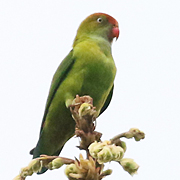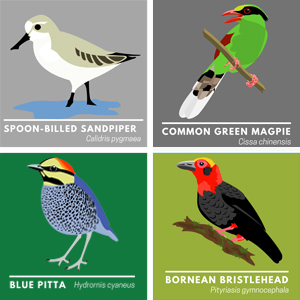
It has been a long time since I have written anything about the Yonok Wetlands project, instigated by Mick Davies and Dowroong Damlamajak, near Chiang Saen. The reason for this is not my lack of support for the project, just that I have been very busy; however, it is now time for me to point out some of the good work that Mick and Dowroong have been doing.
Yonok Women’s Group
Dowroong has set up the Yonok Women’s Community/Conservation Group centred around the village of Ban Huai Nam Rak which meets on a regular basis to spread the conservation message at community events such as festivals and fetes. The group works at creating a community spirit and encourages this to spread to local conservation issues. Perhaps their greatest success is persuading local markets to stop the sale of wild birds as a food item, something which has had a major impact on the level of bird trapping in the area.
Harnessing the energy of local women’s groups to further conservation of the Chiang Saen area is an excellent move and this strategy has been one that has been proven to work well. In Kenya Wangarai Maathai initiated the idea of the planting of trees with women groups in order to conserve the environment and improve the people’s quality of life. She has since gone on to win the Nobel Peace Prize in 2004 and to become Kenya’s Assistant Minister for Environment, Natural Resources and Wildlife. Perhaps Dowroong can go on to do the same in Thailand?
Hunting on the Mekong
Mick and Dowroong’s vigilance identified that hunters from Laos crossing into Thailand was a serious issue for bird conservation along the Mekong at Chiang Saen. With assistance from the local unit of the Thai Royal Navy, this problem has been addressed and an increase in waterbirds along the Mekong was immediately noted.
The full story on this, with photographs, can be read in Mick’s own words here: Laos Hunters Invade Thailand.
Chiang Saen Lake/Yonok Wetlands & Ramsar Convention
Mick quite rightly questions the value of the Ramsar Convention and its application in Thailand. It seems that the local Ramsar representative in the Chiang Saen region is one of the biggest culprits in encroachment into wetland habitats having turned an area of Yonok wetlands into an area for private rice cultivation. It appears that this representative is to face prosecution for these actions – “This RAMSAR guy is currently facing prosecution for stealing YONOK WETLAND “LAND” for rice planting for his personal gain” [Quote from Yonok Wetlands website].
The Ramsar Convention is essentialy a voluntary conservation treaty that any nation can sign so long as it complies with a few commitments such as designation of Ramsar sites, the “wise use” of wetlands, establishment of reserves and the training of wetland researchers and the consultation with other nations in regards to trans-boundary wetlands. These commitments are rather poorly defined and open to a wide variety of interpretations. On top of this there is little in the way of enforcement. This comes from the Ramsar Convention website;
“The Ramsar Convention is not a regulatory regime and has no punitive sanctions for violations of or defaulting upon treaty commitments – nevertheless, its terms do constitute a solemn treaty and are binding in international law in that sense. The whole edifice is based upon an expectation of common and equitably shared transparent accountability. Failure to live up to that expectation could lead to political and diplomatic discomfort in high-profile international fora or the media, and would prevent any Party concerned from getting the most, more generally, out of what would otherwise be a robust and coherent system of checks and balances and mutual support frameworks. Failure to meet the treaty’s commitments may also impact upon success in other ways, for example, in efforts to secure international funding for wetland conservation. In addition, some national jurisdictions now embody international Ramsar obligations in national law and/or policy with direct effect in their own court systems.“
Recent Sightings
Mick and Dowroong regularly update their recent sightings page and it nearly always contains records of birds which are very scarce in Thailand. They regularly see species such as Jerdon’s Bushchat, Long-billed Plover, River Tern, River Lapwing, Grass Owl etc. Take a look at their sightings page and if the birds on there whet your appetite then maybe you can visit them to help in their conservation efforts.
birds, birding, thailand, nature, national parks


 March 9th, 2009
March 9th, 2009  Nick
Nick  Posted in
Posted in 










